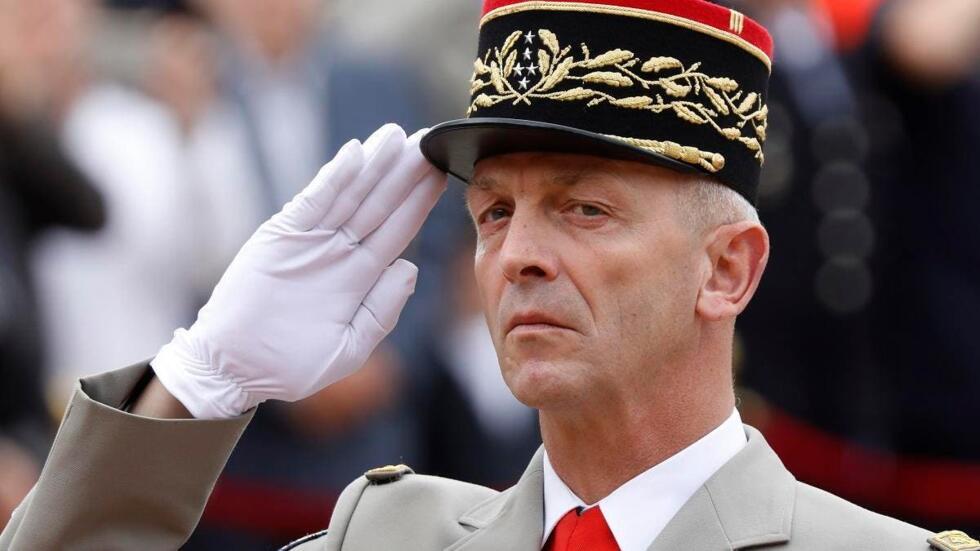What pushed General Lecointre to step down as head of French armed forces?
François Lecointre has announced his resignation as chief of defence staff to avoid being dragged into a political debate ahead of next year's presidential election. His decision comes at a turbulent time for the army as France prepares to scale back its operation in Mali, and following a row sparked by retired generals who have warned of the risk of civil war.
Issued on:

Lecointre announced on Sunday he would step down on 20 July, exactly four years after taking up the post.
“The main reason is to avoid the politicisation of the army chief’s role,” the 59-year-old said in a televised interview with RTL’s Grand Jury.
It would be customary to hand over at the end of next year’s presidential campaign but Lecointre sought to dissociate the two events, saying he didn't want the head of the armed forces to be associated with a political party.
“If you are suspected of serving a political clan, you cast doubt on the army’s independence.”
The Elysée confirmed the news in a statement on Sunday and announced that Lecointre would be replaced by the current Chief of Staff of the Army, Thierry Burkhard.
Lecointre said it was important to remind people that he served the president’s office, “not Emmanuel Macron".
“We must prevent people thinking that a chief of defence staff is chosen for his political opinions.”
"J'ai demandé au président de la République de me laisser partir, à partir de 4 ans de mandat, c'est-à-dire le 21 juillet prochain (...) La raison est d'éviter qu'il y ait une politisation de la fonction de chef d'état-major des armées", a expliqué l'officier #LeGrandJury pic.twitter.com/ASjTCNVbpX
— Le Grand Jury (@LeGrandJury) June 13, 2021
Dissent within army ranks
There has been widespread speculation in French media that Lecointre’s early departure is linked to an open letter by semi-retired generals suggesting a military coup might be necessary to save France from radical Islamism which could result in "civil war".
On Saturday Le Monde reported that Macron’s government had forced Lecointre to summon six retired generals to a “higher disciplinary council” following their remarks. The paper said Lecointre had been pressured to speak out against the signatories, while military officials would have preferred the matter be dealt with privately.
A second open letter, signed anonymously by serving military, was published in early May in support of the generals' stance.
“The open letters have electrified and divided the military community and undermined [Lecointre’s] authority," an officer told Le Point weekly.
At the time General Lecointre said there was no desire for an uprising within military ranks and accused the retired generals of breaking their duty of reserve. “The more senior they are, the more serious the sanctions will be,” he said.
The backlash was personal: some within army ranks called Lecointre a “traitor” and a “pro-Macron doormat”. Christian Piquemal, one of the former generals and instigators of the letter, wrote of his profound contempt for Lecointre.
In Sunday's interview Lecointre said the former generals had “lacked discernment” and that "armies must obey, no matter who is in power".
“The risk of a coup d’etat doesn’t exist, it’s a fantasy,” he said.
Pulling back from the Sahel
Lecointre's decision comes shortly after president Macron announced the end of France’s Barkhane force in Mali, after more than eight years.
It will be replaced by support for local partners and a counter-terrorism organisation, re-focused around an “international alliance" involving other European soldiers.
Much of Lecointre's term in office has revolved around the Sahel and "the last few months have been tough in view of the head of state's strategic shifts," wrote Le Parisien, calling the resignation a "bitter departure".
“Sometimes, the armed forces and their entourage are exasperated by French diplomats’ lack of creativity and extreme prudence,” it continued.
According to Le Point, there is "not the slightest doubt" that "François Lecointre did not want to be at the helm in dismantling operation Barkhane".

An exhausting job
But the army itself is keen to take the drama out of Lecointre’s decision to step down.
“The last five army chiefs have had mandates of between three and four years,” Admiral Alain Coldefy told RFI on Monday. What's more, Lecointre had first talked to Macron about resigning in November 2020, months before the Barkhane announcement and the open letters.
“They are not linked,” he insisted.
Lecointre is operational commander of some 30,000 members of the armed forces, along with those deployed here in France as part of the anti-terrorist Sentinel force.
“He has to manage critical situations around the clock all year round. It all mounts up. It’s an exhausting job," Coldefy said.
He insisted Lecointre “wasn’t particularly perturbed by the letters” adding there would always be “one percent screaming their hatred on social media”.
Lecointre will hand over to Thierry Burkhard on 21 July, shortly after presiding over the traditional Bastille Day military parade down the Champs-Elysées which he hopes will be “normal” this year.
Once that is done, he plans to go on and work in the voluntary sector, as a prison visitor.
Daily newsletterReceive essential international news every morning
Subscribe